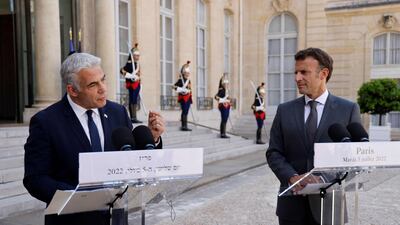Israel’s new interim prime minister, Yair Lapid, said that a continuation of the status quo with Iran may lead to a nuclear arms race in the Middle East that would “threaten world peace”.
Mr Lapid spoke before meeting French President Emmanuel Macron on Tuesday in Paris, where the two leaders were expected to discuss efforts to revive the nuclear deal with Iran as well as tension on Israel’s disputed maritime border with Lebanon.
He arrived in Paris on Tuesday for a visit that was planned by predecessor Naftali Bennett, whose coalition government collapsed last week.
The former Israeli foreign minister said before his departure in Tel Aviv that he would use his first trip abroad as prime minister to raise the recent attempt by Lebanese militant group Hezbollah to fly three surveillance drones towards an Israeli oil rig in contested waters.
France has close connections with Lebanon, where it was once a colonial power, and Mr Macron has repeatedly sought to broker a resolution to the country’s political and economic crises.
The US has been mediating efforts to demarcate the maritime border between Israel and Lebanon to end a dispute over offshore energy exploration, though an agreement has yet to be reached.
“Israel will not sit back given these repeated attacks,” Mr Lapid told reporters in the courtyard of the Elysee Palace before talks with Mr Macron.
“Hezbollah is a terrorist organisation threatening Israel” that is “trying to attack us with Iranian rockets”, he said.
Lebanon rejects Israel's claim that the Karish gasfield lies within its territorial waters.
“We had a long discussion about Lebanon, we presented intelligence on Hezbollah and its activities,” Mr Lapid said after the meeting.
He gave no details, but said the information was “connected to the attacks on the gas rig”.
“The government of Lebanon needs to restrain Hezbollah in the face of such attacks or we will be compelled to do so,” Mr Lapid said.
“One of the key factors to stabilise Lebanon would be its ability to become an exporter of gas,” an Israeli government official said later.
The Lebanese government had signed a deal with French oil major Totalenergies and “therefore France is a player on the issue”, the official said.
Mr Macron said both sides should “avoid any action” that could worsen relations between Israel and Lebanon.
Mr Lapid also reiterated Israel's stance against international efforts to revive a 2015 nuclear accord with Iran.
Acknowledging that France disagreed with that view, he said that what was beyond dispute was that “Iran is violating the agreement and continues to develop its nuclear programme”.
The French president said he would “make every effort” to make Tehran “see reason” and return to the negotiating table.
Israeli officials fear that giving Iran sanctions relief in exchange for curbs on its nuclear programme could allow Tehran to increase funding to Hezbollah and Palestinian militant group Hamas.
Israeli Defence Minister Benny Gantz, speaking in Athens on Tuesday, said “we can confirm that Iran is methodically basing itself in the Red Sea, with war ships patrolling the southern region”.
Four such ships had been detected in “recent months”, Mr Gantz said.
The EU has been the main mediator between Iran and the US in the latest effort to revive the 2015 accord that curbed Iranian nuclear activities in return for sanctions relief.
A senior aide to Mr Lapid told Reuters that while Israel opposes a return to the deal, it could accept a tougher accord.
“We do not oppose a deal. We seek a very strong deal,” the aide said.
“We want an end to the unending talks,” the aide said, calling for “co-ordinated pressure” on Iran and offering help with “drafting an appropriate framework” for that.

